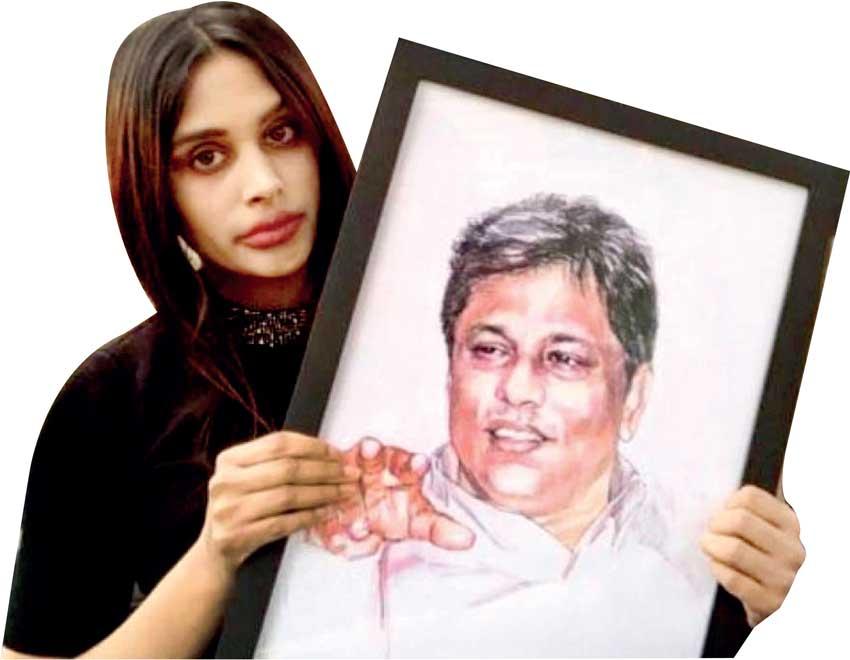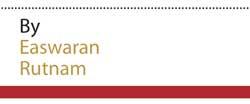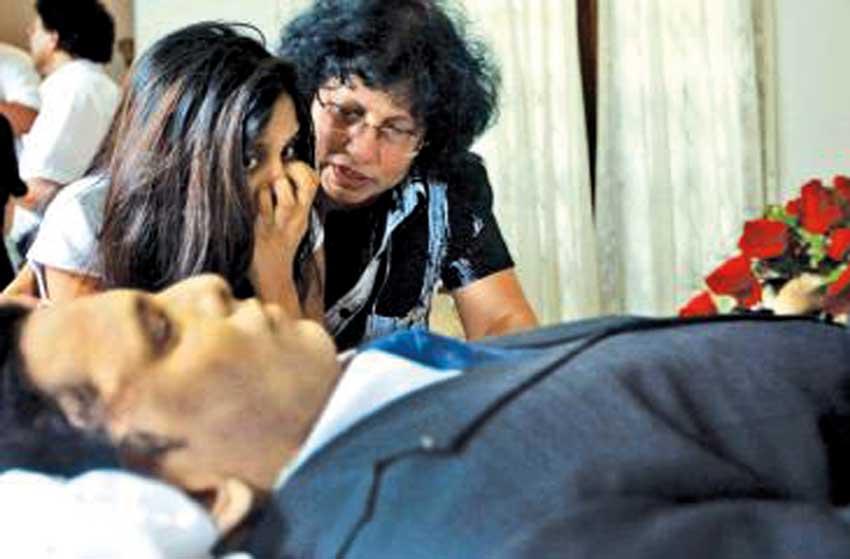12 Mar 2020 - {{hitsCtrl.values.hits}}

 Slain journalist Lasantha Wickrematunge’s daughter Ahimsa Wickrematunge has been fighting a lone battle to seek justice over her father’s death, a battle which seems to be heading to a dead end. However Ahimsa Wickrematunge insists that she will continue her fight despite the many obstacles in her way. Ahimsa Wickrematunge also defended her uncle, Lal Wickrematunge who has been accused of failing to push for more progress in the investigations while enjoying the perks as a diplomat under the UNP Government.
Slain journalist Lasantha Wickrematunge’s daughter Ahimsa Wickrematunge has been fighting a lone battle to seek justice over her father’s death, a battle which seems to be heading to a dead end. However Ahimsa Wickrematunge insists that she will continue her fight despite the many obstacles in her way. Ahimsa Wickrematunge also defended her uncle, Lal Wickrematunge who has been accused of failing to push for more progress in the investigations while enjoying the perks as a diplomat under the UNP Government.
Extracts of the interview:
Q Looking back at how things have gone with the investigations over the death of your father, do you realistically feel that justice will be served?
Looking back at the last several years in particular, I have every reason to be confident. When the CID investigation started in earnest in late 2015, it took detectives less than two years to gather all the evidence necessary to identify the military intelligence killer squad that killed my father, and abducted and tortured so many others. The evidence is not going away. Murder has no statute of limitations, so one day, those responsible will be vulnerable to prosecution.
It is Sri Lanka that will benefit from my father’s killers being brought to justice, not any foreign country or organisation
It is only those outside of Sri Lanka who can keep this cause alive without risking their lives
I have been humbled by the number of people who have expressed their support to me silently, and volunteered information, from all walks of life inSri Lanka
The President may be immune to prosecution in Sri Lanka and abroad, but he is not immune to the truth, and to activism against autocratic tendencies
Q While very little was expected on the investigations from the Rajapaksa regime prior to 2015 do you feel the UNP Government let you and your family down by not aggressively pushing forward with the investigations when they had the chance?
What I would fault the UNP for is not “failing to aggressively push forward” but something a lot more sinister. On countless occasions, both President Sirisena and Prime Minister Wickremesinghe actively sabotaged the investigations or turned a blind eye to their ministers and military commanders who were doing the same.
The CID officers who handled the investigations were subjected to harassment and government surveillance. Essentially, when the President and Prime Minister realised whom the evidence led to, they threw the investigators under the bus and decided to cut political deals. Even today, the UNP has been largely silent as those who worked so hard for justice are being vilified and persecuted by the government.
This is not just letting me down or my family down, but it is a betrayal of the very ideals that people like Ranil Wickremesinghe espouse, come election season.
When the CID investigation started in earnest in late 2015, it took detectives less than two years to gather all the evidence necessary to identify the military intelligence killer squad that killed my father
Q But there was a feeling that Lasantha’s brother Lal (your uncle) could have played a bigger role to ensure justice for his brother when he was a diplomat under the UNP Government. Don’t you agree?
As the Consul-General of Sri Lanka in Sydney, I don’t understand what bigger role anyone expects him to have played. He was only a diplomat. To my knowledge, he cooperated fully with the CID investigators on those occasions that they reached out to him, but it is not the role of diplomats or politicians to direct or interfere in investigations. All the CID needed was a government that had the political will to see justice done, not one that sided with the perpetrators. Given that the government had decided to turn its backs on us and let the death squad have its way, there is nothing my uncle could have done to change that.
Q Is there more the international community could do to ensure accountability?
My father was killed in Sri Lanka, by Sri Lanka. It is Sri Lanka that benefits from deterring future public officials from murdering truth tellers who expose their wrongdoing, and from a domestic justice system that keeps all Sri Lankans safe regardless of their political opinions. On average, governments change in Sri Lanka every five or ten years. If Sri Lankans allow their rulers to normalise the killing of people they disagree with, and become numb to it, it is our country that will suffer in the long term.
It may be left to the international community to help Sri Lankans understand that it is Sri Lanka that will benefit from my father’s killers being brought to justice, not any foreign country or organisation.
I am grateful to the support we have received from the Centre for Justice and Accountability (CJA) as well as international media rights groups, especially because domestically today, people are frightened to speak out. Every single person who played a key role in my father’s investigation has either fled Sri Lanka, like Nishantha Silva, or been persecuted and subjected to abuse, like the CID’s former director Shani Abeysekara. Journalists who reported honestly about the case have been chased out, harrassed or vilified. Barely anyone has spoken out for them in Sri Lanka. It is only those outside of Sri Lanka who can keep this cause alive without risking their lives.
Thanks to the CID investigation made possible by brave detectives like Shani Abeysekara, Nishantha Silva and others I cant name because I don’t want to endanger them, we now know exactly which unit of which branch of the military under whose command was responsible for my father’s death, and who know which police officers and officials participated in covering it up

Q Your father exposed some high profile people during his time. But with his death also died The Sunday Leader and the style of investigations he did. Do you think such journalists will ever pop up in Sri Lanka again?
There are several journalists from Sri Lanka who have written and produced serious investigative journalism over the last several years, but unlike when my father was alive, they are not all concentrated at The Sunday Leader.
You have Dharisha Bastians, who edited the Sunday Observer and writes for the New York Times. There is Nirmala Kannangara at the Daily Mirror, and Marianne David at Daily FT who have investigated thorny issues in depth. Mandana Ismail Abeywickrema is Editor of The Morning, which regularly covers and exposes thorny issues. We’ve seen a similar investigative tenacity in the coverage of the treasury bond scam by Chevaan Daniels’ News First team.
What all of these journalists have in common is they all worked closely with my father and The Sunday Leader. Many of them have become mentors to budding journalists, both in mainstream and new media outlets. For more to rise, and for investigative journalism to flourish, the people of Sri Lanka will need to decide that they want to know the truth regardless of who is in power, and that they will stand up for journalists who are being coerced and persecuted by any political or government force. I am hopeful that Sri Lankans will once again decide to stand up for the truth.
Q The recent US Appeal Court order gives us the impression you will continue your fight when President Gotabaya Rajapaksa is no more President. So basically you intend to continue fighting no matter what?
I never stopped fighting, and I never intend to stop. For many years, I just failed not seeing a direction to take. But thanks to the CID investigation made possible by brave detectives like Shani Abeysekara, Nishantha Silva and others I cant name because I don’t want to endanger them, we now know exactly which unit of which branch of the military under whose command was responsible for my father’s death, and who know which police officers and officials participated in covering it up. The President may be immune to prosecution in Sri Lanka and abroad, but he is not immune to the truth, and to activism against autocratic tendencies.
Q What is the kind of support you have got in Sri Lanka in your pursuit for justice?
I have been humbled by the number of people who have expressed their support to me silently, and volunteered information, from all walks of life in Sri Lanka, from police officers, to prosecutors, to Members of Parliament even from the Podujana Peramuna, as well as journalists, military officers and government officials. Many of these people knew or had relationships with my father, and have told me stories about their work together. It is because of people like this that I realised early on that the Ranil Wickremesinghe Government would protect my father’s killers while publicly pledging to bring them in. And it is because of people like this that I know that criminal justice causes like these are little more than a political football to those in the highest echelons of power.
But my promise to those who have supported me, and who have remained in touch, is that I will never give up on them. I will never give up on my father and bringing those who killed him to justice. They will find in me an eager ally, who will help to patiently and silently martial the supporters of justice.
25 Apr 2024 20 minute ago
25 Apr 2024 28 minute ago
25 Apr 2024 2 hours ago
25 Apr 2024 2 hours ago
25 Apr 2024 4 hours ago